The Holdovers is an instant Christmas classic and an excellent reprise of the powerhouse Payne and Giamatti pairing. Much like Giamatti’s lovably acidic portrayal of Miles in Sideways, he inhabits Paul in The Holdovers with acerbic, supercilious delight. Whereas Miles enjoyed wine like a sommelier, taught literature, and aspired to be a published author, Paul’s drink of choice is Jim Beam, he dreams of writing a history monograph, and he is a turgid history teacher/wannabe scholar, citing famous figures (usually from the Greek or Roman empire) whenever haranguing and belittling his students with historical comparisons.
Paul’s favorite pastime—weaponizing esoteric historical references in ornery tirades (often uttered in Latin, for scholastic effect)—peppers the script with a heavy dollop of cultured sass. Every time he haughtily bemoans the philistine reprobates pervading his classroom (an innocuous group of ordinary teenage boys), it is easy to intuit his dormant loneliness. Neurotic, haughty, and petty, Paul’s crotchety self-righteousness is rooted in deep sadness and isolation.
Similar to Miles, Paul is a hopeless romantic, covertly pining for touch, romance, and recognition. He’s an intellectual outcast who’s sublimated melancholy into erudition. Both characters also exhibit uniquely distinct physical tics (Paul has a lazy eye; Miles has a stutter) and mannerisms. The parallels between the two characters’ respective personalities overlap enough to allow Payne and Giamatti to fall into familiar rhythms, yet they are simultaneously divergent enough to allow the actor/director duo the space they need to explore new notes entirely.
Unlike Sideways, which takes place in sunny Southern and Central California, The Holdovers takes place during a two-week Winter Break at Barton Academy, a private school in frigid New England. The film’s icy veneer is illusory, brimming as it is with radiant humanity underneath. Meanwhile, Sideways leans fully into the astringent half of its bittersweet undertones, despite the sun-glistened backdrop of verdant golf courses and vineyards. The two films are polar opposites cut from the same cloth.
The screenplay for The Holdovers, written by David Hemingson and resembling nostalgic coming-of-age capsules in the literary spirit of J.D. Salinger’s Catcher in the Rye and John Knowles’ A Separate Peace, feels at once timeless and whimsical, serpentine and straightforward. It is not without snarky ripostes and caustic rantings; at the same time, it lacks the acerbic bite that defined Payne’s screenplay for Sideways. More humane and wistful than that wine-country classic, The Holdovers forces Payne and Giamatti to work slightly outside their sardonic element, which is mostly for the best.
Giamatti resembles a mentor figure more akin to Robin Williams’ John Keating in Dead Poet’s Society, shedding Miles’ selfish and surly overtones. The role, albeit familiar territory for Giamatti, might be his most realized performance to date, drawing upon all the motifs that define his overarching typecast: bookish, pedantic, irritable, and yet beaming with latent warmth.
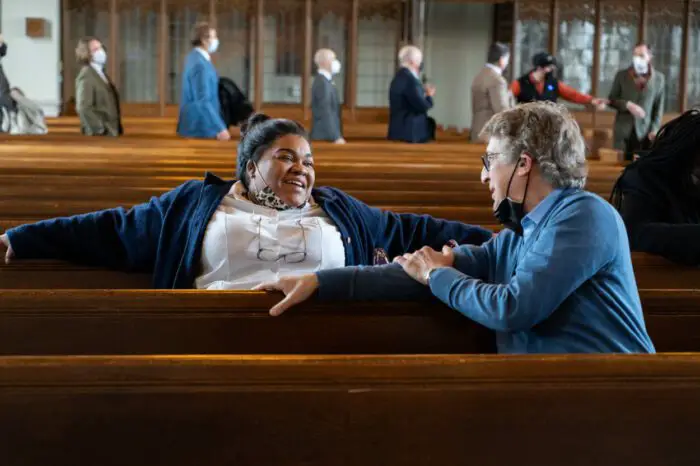
Perhaps more impressive are Payne’s directorial flourishes. Evoking the cinematographic proclivities of 1970s filmmakers (the influential likes of Hal Ashby’s Harold and Maude and Robert Altman’s McCabe & Mrs. Miller pervade the fuzzy, 35mm cinematography), Payne reverberates the eras’ ambiance via faraway zooms, sentimental Labi Siffre and Cat Stevens’ needle drops, rustic prep-school environs, and darkly-lit oaken hallways. The aesthetic is immersive and lived-in—mildly depressed but teeming with lyrical specificity.
One would be remiss not to mention the transfixing debut performance by Dominic Sessa, who plays Angus–a rich, young, misfit protagonist. Angus is financially supported yet emotionally estranged from his frigid mother, who has recently remarried in the wake of his father’s psychotic break. Sessa captures the latent percipience of Angus’s youthful restlessness, emitting the right mixture of adolescent angst and unbridled nervous energy. He’s mischievous and ambitious, erratic and focused, childish and yet mature beyond his years.
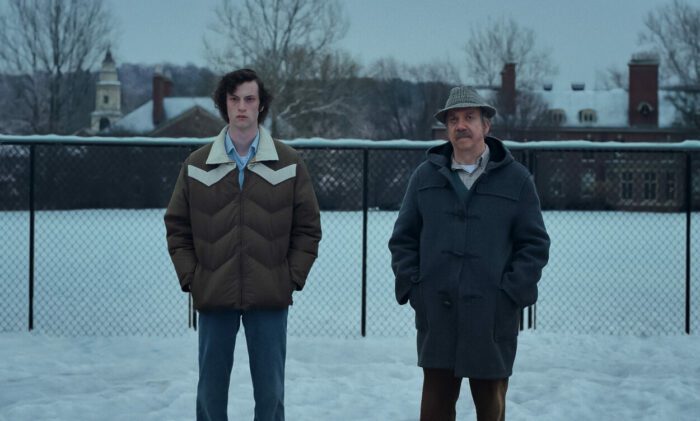
In the film, Angus showcases a range of emotional and intellectual depth. He sneaks out at night to wander the halls and play the piano; he invents witty white lies on the spot to help Paul navigate various imbroglios; he dislodges his shoulder in one of the film’s funniest and most startling tonal shifts; he kisses a cute girl at a Christmas party.
Ever so slowly, his free-thinking and mercurial openness slowly defrosts Paul’s reclusive, Scrooge-esque cynicism. Incrementally, through conversation and vulnerability, Angus softens the edges around his notoriously draconian teacher, restoring Paul’s faith in humanity by fostering a friendship with the curmudgeon.
That Dominic Sessa was discovered in a boarding school (the young actor was supposedly more focused on playing hockey than acting) is a fitting coincidence. Sessa is a rare, serendipitous find: seemingly born for this role, he exudes multitudes with his angular physiognomy alone. His starkly delineated bone structure and discerning brow seal the deal, giving Angus’s dynamic facial expressions the perfect balance of rebelliousness and innocence, intelligence and naivety, wryness and pathos.
Sessa makes Angus feel wise beyond his years yet as believably willful, stubbornly arrogant, and defiantly self-centered as any normal teenager. By the end, his naturalistic performance is arguably the film’s unsung hero (despite all the justifiable awards buzz around Paul Giamatti and Da’Vine Joy Randolph).
Speaking of Da’Vine Joy Randolph, it is equally impossible not to be warmed by her turn as Mary Lamb, the lead cook for the all-boys prep school cafeteria. Throughout The Holdovers, Mary can be found chain smoking and drinking (when not cooking up a delicious spread with all the holiday trimmings). She is quietly in the throes of grief, mourning her late son, who died in the Vietnam War.
We eventually learn that Mary’s son also attended Barton Academy during a holiday church service, which is why she worked there (to secure him a prestigious spot at the expensive prep school). The fact that she remains working in the cafeteria highlights the racial/socioeconomic disparities of the era and the parental sacrifices lower-income parents make every day for their children. That her sacrifices were made in vain due to the horrors of war adds an extra dimension to her personal tragedy.
Beyond her tragic backstory, Mary Lamb often feels lacking as a character on paper. Fortunately, Da’Vine Joy Randolph has the acting chops to fill the screenplay’s shortcomings with emotional dynamism. Randolph captures the heartbreak, the unspoken umbrage, and the selflessness of Mary with incredible agility, imposing her powerful aura in an understated and heartbreaking way by slipping soulfully into the background. Mary may appear peripheral in many scenes, but her emotional presence is palpable and central. She has the keen ability to speak volumes with a side glance or a sigh. Accordingly, she has some of the most winsome moments in the film.
That said, Randolph’s northeastern accent intermittently and awkwardly oscillates, and her character’s arc feels a bit unresolved by the end. Whereas Paul and Angus develop and mature in surprising and inspiring ways, Mary is somewhat overlooked in the script’s final act, leaving her character unfairly flatter than she deserves to be.
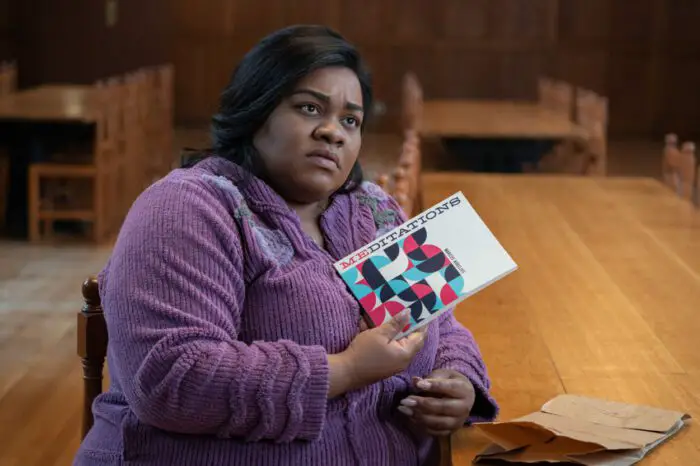
Perhaps the most underdeveloped aspect of the film is Mary’s thinly written romantic subplot with Danny, a school janitor who harbors a crush on Mary. Danny is left abjectly unformed: an ancillary afterthought who deserves more substantive dialogue and meatier scenes. His role doesn’t detract from the film overall. Nevertheless, he is woefully overlooked as a side character, creating a distraction instead of adding a rich layer to the film’s tapestry of interpersonal relationships.
Equal parts punctilious and poignant, the screenplay intimately places this ensemble together over a long winter break at a private high school. A classic misfit Christmas, the thematic telos can be vaguely predicted in the first fifteen minutes, and yet, the power of the film is in the scene-by-scene pudding. The Holdovers quickly becomes a matter of relishing the rich, dramatic beats and rueful realism it tonally achieves as initial frostiness gives way to small gestures of kindness. The stirring and crowd-pleasing underbelly of the screenplay slowly, organically, and credibly materializes, crystallizing into a tender tale of Paul, Angus, and Mary’s oddball friendship overcoming generational and temperamental differences.
At the start of the Winter Break, Paul is riotously hot-tempered and peevish. A pedantic, stern teacher with fathomless regret, he bristles with rancorous aloofness at what he sees to be a corrosive decline in academic integrity and basic discipline. He is a history teacher who recites pedestrian lines like, “History is not simply the study of the past [but] an explanation of the present,” with absolute conviction. He loves to summon the austere triumphs of bygone civilizations as counterexamples highlighting the youth’s undisciplined callowness. When Angus balks that it’s “like 15 degrees outside” after being propositioned to get some fresh air, Paul chidingly reminds him that “the Romans bathed naked in the freezing Tiber […] adversity builds character, Mr. Tully.” For Paul, the present-day adolescent is a milquetoast mockery of our dignified ancestors.
Angus, a mischievous pariah, is initially unlikable as well. Brimming with aimless energy, he feels naturally groundless, brazenly headstrong (propositioning Paul not to lecture on the last day of class), and existentially adrift. He may receive the best grade among the class on his exam and emanate a latent maturity beyond his years, but he also carries a miscreant edge and a chip on his shoulder.
With a fondness for nude magazines and selling cigarettes, Angus is a troublemaker on campus who can’t seem to keep himself out of trouble. From a phone call with his mom, who’s abandoned him to enjoy a delayed honeymoon with his stepdad (his biological father is in a psychiatric clinic), we see his life as one of stark contrasts: he’s clearly wealthy and yet estranged from the love of a caring family.
Without direction or guidance, Angus ends up forced to spend the holidays at Barton Academy as a “holdover,” which doubles as a glaring indictment of his dysfunctional family. Sadly, he’s spoiled enough to be sent money and granted tuition to the prestigious Academy, but his mother doesn’t even want to spend time with him during Christmas break.
At first, Angus is accompanied by an eclectic group of other “holdovers,” including the ultra-affluent Teddy (Brady Hepner) and a Korean-American named Ye-Joon Park (Jim Kaplan). Unfortunately, when Teddy’s rich father’s helicopter arrives to pick up the other boys, Angus can’t reach his mother for permission and thus isn’t allowed to embark on the ski trip. Instead, he is left peerless, stuck sleeping in the dark, cold dormitory alone and sharing meals with the company of Paul and Mary Lamb.
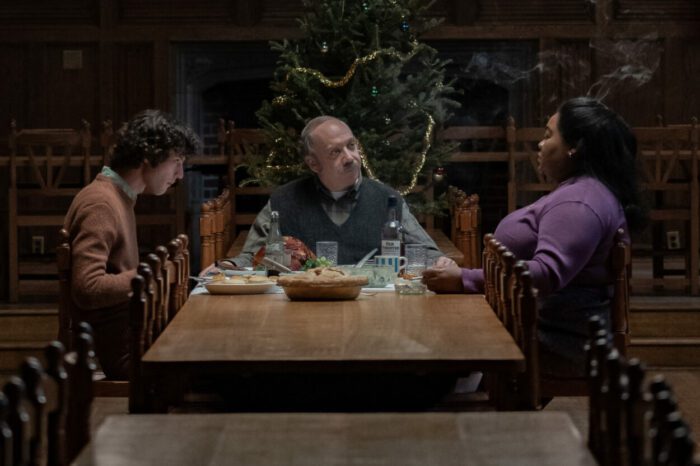
What appears to be a chamber piece set entirely on the school grounds gradually develops into something refreshingly wayward, meandering, and expansive, taking unexpected narrative detours. A madcap chase sequence featuring Paul scurrying after Angus (after the latter is caught trying to book a hotel room) ends suddenly as Angus abruptly leaps and crashes into an equipment pile in the school gym. The fall dislodges Angus’s shoulder, triggering an emergency visit to the local hospital. Afterward, Paul and Angus share a burger at the local diner, where they receive and ultimately accept an invitation to a Christmas party.
Though initially reluctant, Mary talks Paul into attending the Christmas party and letting Angus tag along. Paul, Angus, and Mary arrive in festive spirits, which are dampened before long by unrequited romantic hopes and a little too much alcohol. Notwithstanding, they begin forming a sense of companionship and camaraderie. By Christmas dinner, Angus uses this newfound chemistry to successfully wheedle his superior into taking a weekend “field trip” to Boston. In Boston, Mary Lamb reunites with family as Paul and Angus explore museums, watch movies at the theater, and take an ill-advised detour to a psychiatric hospital.
In the same vein as Sideways, ensuing misadventures reveal latent truths about Paul and Angus that gradually bring them together. (Spoilers follow for the film’s final act.) They help one another out by upholding white lies and confiding in one another about lost love, personal grievances, unspoken traumas, and social insecurities. Angus divulges the story about his father’s mental illness and fast psychological decline; Paul details how he was kicked out of college after a rich kid was caught plagiarizing his work. They cleverly lie to doctors after Angus dislodges his arm and create a false identity for Paul during an ego-endangering run-in with old acquaintances. In a nutshell, they grow to see the other as complex human beings instead of generational stereotypes. They become an archetypal odd-couple: an unruly adolescent and a cantankerous academic.
Meanwhile, Mary Lamb plays an important third wheel, offering Paul the nightly booze and emotional insights he needs to warm his frigid heart. Sure, Mary doesn’t receive the same level of support or emotional payoff as the other to receive in the screenplay. Still, one can intuit that bonding with Angus and Paul is helping her slowly and incrementally overcome the paralyzing sorrow surrounding her son’s death. The final image of their unconventional Winter Break, a pull-away zoom show of the three celebrating the Times Square Ball Drop on New Year’s Eve, is picture perfect: framing the three (along with Danny) memorialized in a snapshot.
As the trio hug and celebrate the transition into another calendar cycle, the audience is placed at an omniscient remove. Detached enough to see the moment from a nostalgic lens, the transient significance of their fleeting Christmas vacation is viscerally tangible. Just as Paul waxes poetic about history explaining the present, one can sense that the relationships formed during the two-week holiday will be seminal in their collective personal journeys. They’ve managed to form a makeshift family that is ephemeral yet everlasting. It may not survive in actuality, but it will in their shared memories, and that is sometimes as critical as anything in life.
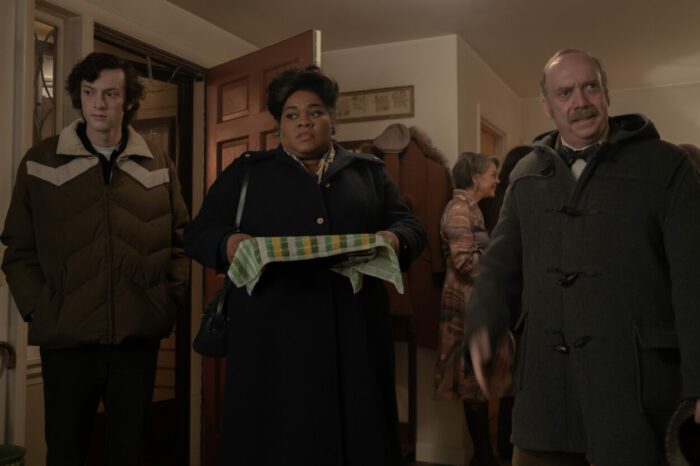
The epilogue is much harsher and less sentimental. A semi-tragic turn of events leaves Paul fired after he chooses to go out on a limb to defend Angus, creating a fib to shield the overly-maligned kid from imminent expulsion and being shipped to a military school. The moral decision to take the fall is a valiant sign of leadership from Paul, proving he does care about others and has some faith in the younger generation. The resolution resonates particularly well insofar as it aligns with the motif of white lies as a sign of companionship.
Though losing one’s long-standing job is rarely an auspicious event, it feels apropos for Paul, who seems stuck in a vicious, soul-crushing routine. It becomes painstakingly clear that he needs a little push and motivation to break out of his complacency. Thus, while it’s disheartening to see him fired, the fact that he will be forced to leave his comfort zone and pursue long-forgotten dreams is reassuring.
Mary punctuates this inference by gifting Paul a notebook (to write his much-delayed monograph) before departing. Paul then says goodbye to Angus, claiming to be finally ready to visit Carthage (presumably to research for his book). He drives away with restored vigor and the evil headmasters’ stolen cognac in tow.
A tender-hearted time stamp of a specific setting and moment in history, The Holdovers is a frosty, sugary treat. Elegantly shot, the film casts a seasonal spell, transporting one back to the evocative early 70s. Teeming with wintry warmth, mercurial humanity, and b-minor soulfulness, one can sense that the dreamlike fortnight we vicariously experience will be a historical milestone for Paul, Mary, and Angus, changing each character in profound ways.
Evoking the memoir-rich clarity of a Linklater film with the real-life radiance and humaneness of an American holiday classic (a la A Christmas Story or It’s a Wonderful Life), The Holdovers will undoubtedly be re-watched for decades and decades to come. For many, it will surely come to be minted as a definitive Christmas gem of the 21st century.


